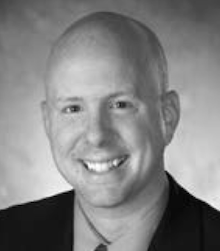June 19, 2015

Dr. David Shearer
Whether the issue is lack of awareness, risky behaviors that threaten good health, or reluctance to speak up, there is a big, preventable problem plaguing the health of American men – not seeing a doctor.
The Centers for Disease Control and Prevention reports that men are 24-percent less likely than women to see their doctors for annual exams and preventive services. Add to this fact that more than 12 percent of men 18 years and older are in fair or poor health, and more than 34 percent are obese.
Even with these kinds of statistics stacked against them, it’s never too late for men to take control of their health, according to Dean & St. Mary’s Family Medicine physician Dr. David Shearer.

He says at every stage of their lives, men should include regular checkups with their doctors, and not just when they’re sick.
Young men from birth to puberty need regular checkups to address immunizations, safety issues and development. Between ages 11 and 12, young males should be seen by their doctors to update their tetanus and meningitis vaccines. Dr. Shearer believes young men in that age group should also receive the HPV vaccine to prevent strains later in life of Human Papillomavirus. HPV is known to cause cancer, including 60 percent of penile cancers.
A visit to the doctor’s office is beneficial for young men around age 18 as they go off to college. This is when they should get their final meningitis vaccine and talk about the transition between home and college – what to expect in terms of mood, sexuality, alcohol use, and other topics.
“From then on until age 50, an annual checkup is probably not needed,” Dr. Shearer points out. “If you’re feeling healthy, the recommendation is a wellness checkup about every five years. Your doctor may perform targeted screening tests more frequently based on your personal risk profile.” Regardless of the reason for a visit to his doctor’s office, Dr. Shearer says there are three questions every man should ask his provider.
Question One: How can I improve my diet?
“The most important thing a man can do is to watch carefully what he puts in his body,” says Dr. Shearer. “Diet is the single most important thing that we have control over in our lives that can lead to the most positive health outcomes and help us avoid illness.”
He advises men to eat more vegetables, fruits, whole grains, good sources of protein – such as meat, beans and nuts – and good fats like olive oil. These foods have nutrients needed for a healthy life, including potassium, calcium, vitamin D and fiber that may protect against chronic diseases. Drink water instead of soda, energy drinks and sports drinks, which are major sources of added sugar and calories in the typical American man’s diet.
Unfortunately, the foods featured at many Super Bowl celebrations, family get-togethers and hangouts with friends are laden with added sugars and salt. Processed foods like ribs, pizza, sausages, bacon, hot dogs and desserts should be regarded as occasional indulgences, not part of an everyday diet.
“And needless to say,” he adds, “stay away from all tobacco products and keep alcohol to a minimum.”
Question Two: How will this medication or test you just prescribed improve my life, and will it have any side effects?
Dr. Shearer recommends that before leaving the doctor’s office, men should make sure they understand why a test was ordered and, more importantly, what the doctor will do if the test is positive or negative. Be clear about the exact medications that should be taken going forward. He says the doctor should provide an after visit summary with an updated, accurate medication list.
If the doctor advises an appointment with a specialist, ask the purpose of this referral.
Dr. Shearer advises that male patients should confirm the date and time of their next appointment, and whether any lab testing is needed in advance.
If questions come up later, a message via MyChart (an Internet-based service that allows patients to access personal medical information and clinic services online) or a call to the doctor’s office can help to clear things up quickly.
Question Three: Do I have any preventive services due now or in the near future?
Primary care offices should be addressing preventive care during any visit, even if an illness is the purpose of the visit.
“If the doctor doesn’t bring it up, I recommend asking,” Dr. Shearer says. “After age 50, a yearly physical is not a bad idea. That’s also when issues like colon cancer become important. And everyone should get an annual flu shot.”
He notes that after age 65, Medicare will pay for an annual exam focusing on wellness and discussing other areas of healthy living, such as mobility, social and financial issues, as well as end-of-life planning.
The bottom line: Men who take an active role in their health and ask the right questions of their doctors can lead longer, healthier lives.

